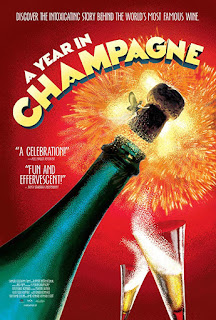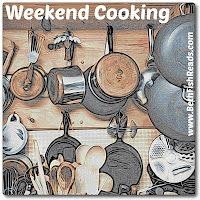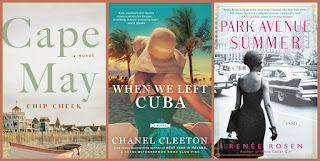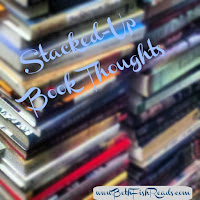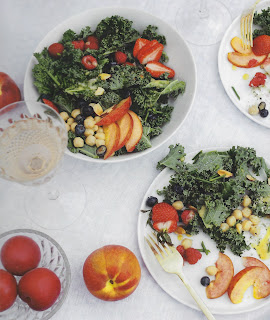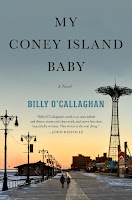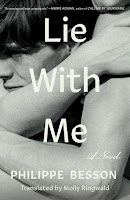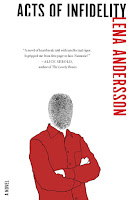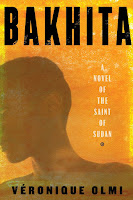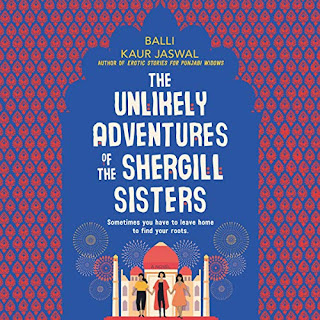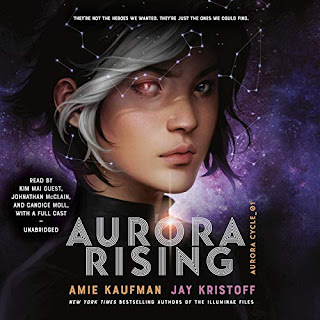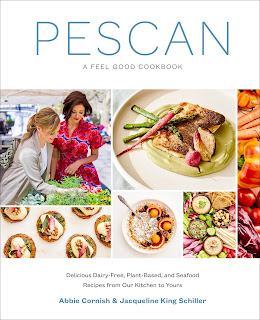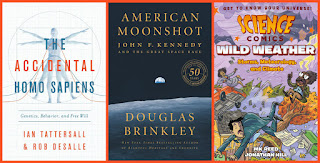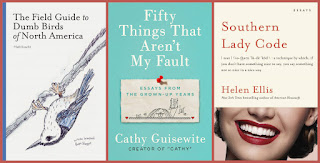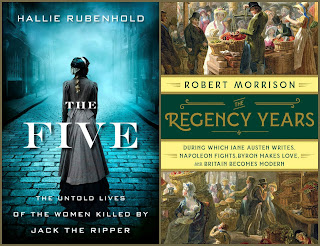 Gawk!
How can it be April already??? And it's an April without the signs of
spring. Here in Pennsylvania, we're just getting crocus and haven't yet
seen daffodils or forsythia. Soon, soon--I know.
Gawk!
How can it be April already??? And it's an April without the signs of
spring. Here in Pennsylvania, we're just getting crocus and haven't yet
seen daffodils or forsythia. Soon, soon--I know.
If
you're wondering where I've been the last couple weeks, here's my sad
(not really) story. March is a really busy editing month, which means
I'm less inclined to read for pleasure. What's more, I read a long book
and listened to a long book, which cuts down on the number of titles
finished (though both were well worth the time investment).
One
casualty has been my short story a week project. I had to let something
slip, and that was it. Oh well, April gives me a fresh start, right? Or
am I just fooling myself (ha, couldn't resist).
 The Sun Is a Compass: A 4,000-Mile Journey into the Alaskan Wilds by Caroline Van Hemert
(Little, Brown Spark, March 19). In this memoir, Van Hemert, a field
biologist who studies birds, tells us about the incredible human-powered
trek she and her husband made from Washington State to the far north of
Alaska. Although they occasionally slept indoors and accepted
hospitality, each inch of their journey was taken under their own power,
sometimes rowing or kayaking, sometimes skiing, and quite often
walking. Neither were new to Alaska or to living in the wilds. They
planned their trip carefully, arranging food drops and delivery (and
pickup) of various kinds of transport (boats and skis). They carried no
guns or rifles but had a satellite phone, just in case. This isn't a
dramatic survival story (though they had a couple scary moments);
instead it gives us a glimpse of wilderness most of us will never
experience: massive migrations, the changing tundra, biting flies, and
close encounters with sea mammals. Van Hemert's keen eye and clear
writing made me feel as if I were right there with her on this once in a
lifetime trip. I listened to the unabridged audiobook (Hachette Audio; 9
hr, 2 min) wonderfully read by Xe Sands. Sands infused her performance
with just the right amount of emotion, awe, and drama, matching Van
Hemert's intent, without crossing the line into movie-of-the-week
theatrical. If you like the outdoors or are curious about Alaska or wild
places, try this in print or audio. For photos of this trip and others,
visit Van Hemert's website. (audiobook copy provided by the publisher)
The Sun Is a Compass: A 4,000-Mile Journey into the Alaskan Wilds by Caroline Van Hemert
(Little, Brown Spark, March 19). In this memoir, Van Hemert, a field
biologist who studies birds, tells us about the incredible human-powered
trek she and her husband made from Washington State to the far north of
Alaska. Although they occasionally slept indoors and accepted
hospitality, each inch of their journey was taken under their own power,
sometimes rowing or kayaking, sometimes skiing, and quite often
walking. Neither were new to Alaska or to living in the wilds. They
planned their trip carefully, arranging food drops and delivery (and
pickup) of various kinds of transport (boats and skis). They carried no
guns or rifles but had a satellite phone, just in case. This isn't a
dramatic survival story (though they had a couple scary moments);
instead it gives us a glimpse of wilderness most of us will never
experience: massive migrations, the changing tundra, biting flies, and
close encounters with sea mammals. Van Hemert's keen eye and clear
writing made me feel as if I were right there with her on this once in a
lifetime trip. I listened to the unabridged audiobook (Hachette Audio; 9
hr, 2 min) wonderfully read by Xe Sands. Sands infused her performance
with just the right amount of emotion, awe, and drama, matching Van
Hemert's intent, without crossing the line into movie-of-the-week
theatrical. If you like the outdoors or are curious about Alaska or wild
places, try this in print or audio. For photos of this trip and others,
visit Van Hemert's website. (audiobook copy provided by the publisher)
 Mama's Last Hug: Animal Emotions and What They Tell Us about Ourselves by Frans de Waal
(Norton, March 12). In a previous life, I was a physical
anthropologist, and my undergraduate thesis was all about nonhuman
primate behavior. Thus when I had the chance to review this book for
AudioFile Magazine, I said yes without hesitation. De Waal is well known
and well respected in the field of primate behavior, and in this book,
he talks the monkeys and apes he's known and observed and what (as the
subtitle says) his (and others') research can tell us about ourselves
and about the other mammals around us. Are we humans the only ones who
feel shame? How about empathy? Why is it that people are the only
animals who blush? Are we altruistic or competitive? This is a
fascinating book and I could barely stop listening. De Waal writes in a
casual style that is easy to follow and understand. He makes his points
by telling stories and giving us much to ponder. Besides apes and
monkeys, we also learn a little bit about other animals, including rats,
elephants, dogs, and cats. If you're an animal lover, you might want to
give this a try. The unabridged audiobook (Recorded Books; 10 hr, 38
min) was read by L. J. Ganser, whose expressive delivery seemed to
capture de Waal's intentions perfectly. De Waal himself reads the
afterword. For more, see my review on AudioFile magazine.
Mama's Last Hug: Animal Emotions and What They Tell Us about Ourselves by Frans de Waal
(Norton, March 12). In a previous life, I was a physical
anthropologist, and my undergraduate thesis was all about nonhuman
primate behavior. Thus when I had the chance to review this book for
AudioFile Magazine, I said yes without hesitation. De Waal is well known
and well respected in the field of primate behavior, and in this book,
he talks the monkeys and apes he's known and observed and what (as the
subtitle says) his (and others') research can tell us about ourselves
and about the other mammals around us. Are we humans the only ones who
feel shame? How about empathy? Why is it that people are the only
animals who blush? Are we altruistic or competitive? This is a
fascinating book and I could barely stop listening. De Waal writes in a
casual style that is easy to follow and understand. He makes his points
by telling stories and giving us much to ponder. Besides apes and
monkeys, we also learn a little bit about other animals, including rats,
elephants, dogs, and cats. If you're an animal lover, you might want to
give this a try. The unabridged audiobook (Recorded Books; 10 hr, 38
min) was read by L. J. Ganser, whose expressive delivery seemed to
capture de Waal's intentions perfectly. De Waal himself reads the
afterword. For more, see my review on AudioFile magazine.
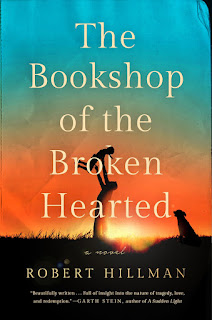 Bookshop of the Broken Hearted by Robert Hillman
(Putnam, April 9). Sometimes you just need to escape, and Hillman's
novel hit the spot. Set in two time periods--eastern Europe during World
War II and rural Australia during the Vietnam War era--this is a story
of three very different people trying to find stability and love in a
wold that seems out to get them. Hannah is a Hungarian Jew who survived
the war, a concentration camp, the Russian army, and two husbands. The
hows and whys of how she ended up in Hometown, Australia, teaching music
and dead-set on opening a bookstore in a community that isn't known for
reading are told through flashbacks. Tom owns a spread and does okay
for himself, despite his loneliness. His wife abandoned him, returning
pregnant by another man. After her son was born she left again,
returning only briefly four years later to reclaim the boy. Peter hates
living with his mother, who is a member of a Jesus cult, and once he's
old enough to figure how to pull it off, he runs away in hopes of being
reunited with Tom. Can these three broken people find in each other the
hope of healing and trust? The book contains some tough scenes and
difficult issues, but I was totally taken in by the three main
characters and their personal struggles. I especially rooted for Tom,
who is a good man and deserves a good life. I liked the way Hillman
ended the book, which seemed realistic and believable. The unabridged
audiobook (Penguin Audio; 9 hr, 26 min), was read by Daniel Lapaine, who
did a good job with the accents and characterizations. I bet you'll zip
through this in either print or audio. (digital and audiobook copies
provided by the publisher)
Bookshop of the Broken Hearted by Robert Hillman
(Putnam, April 9). Sometimes you just need to escape, and Hillman's
novel hit the spot. Set in two time periods--eastern Europe during World
War II and rural Australia during the Vietnam War era--this is a story
of three very different people trying to find stability and love in a
wold that seems out to get them. Hannah is a Hungarian Jew who survived
the war, a concentration camp, the Russian army, and two husbands. The
hows and whys of how she ended up in Hometown, Australia, teaching music
and dead-set on opening a bookstore in a community that isn't known for
reading are told through flashbacks. Tom owns a spread and does okay
for himself, despite his loneliness. His wife abandoned him, returning
pregnant by another man. After her son was born she left again,
returning only briefly four years later to reclaim the boy. Peter hates
living with his mother, who is a member of a Jesus cult, and once he's
old enough to figure how to pull it off, he runs away in hopes of being
reunited with Tom. Can these three broken people find in each other the
hope of healing and trust? The book contains some tough scenes and
difficult issues, but I was totally taken in by the three main
characters and their personal struggles. I especially rooted for Tom,
who is a good man and deserves a good life. I liked the way Hillman
ended the book, which seemed realistic and believable. The unabridged
audiobook (Penguin Audio; 9 hr, 26 min), was read by Daniel Lapaine, who
did a good job with the accents and characterizations. I bet you'll zip
through this in either print or audio. (digital and audiobook copies
provided by the publisher)
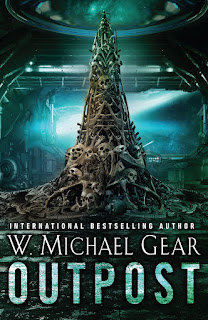 Outpost by W. Michael Gear
(Daw; Feb. 5--paperback). This is the first in the Donovan trilogy by
anthropologist / novelist Gear, and the good news is that all three
books are available now. Watch this space because I can't wait to start
book two. If you aren't a science fiction fan, I hope you take the time
to read the following paragraph, because you might be swayed to give
this a try.
Outpost by W. Michael Gear
(Daw; Feb. 5--paperback). This is the first in the Donovan trilogy by
anthropologist / novelist Gear, and the good news is that all three
books are available now. Watch this space because I can't wait to start
book two. If you aren't a science fiction fan, I hope you take the time
to read the following paragraph, because you might be swayed to give
this a try.
In the future, a colony of Earthlings are
attempting to establish an outpost on the planet Donovan, which is rich
in minerals and elements that people back home covet and need. Human
life is ruled by the Corporation, which is supposed to free people from
all worries about health, education, and housing. Donovan, however,
seems to have been forgotten, and it's been years since a resupply ship
has arrived. As a consequence, the colonists have developed their own
rules for keeping order and for staying alive on a very, very dangerous
planet. When a Corporate ship finally does arrive, the settlement is
disrupted on a number of fronts, and the three people who keep the
peace--especially security officer Talina Perez--are faced with dealing
with newbies, colonists who hope to return home, and a ship's captain
who clearly doesn't understand what she's up against. Although
absolutely science fiction in the sense that we are dealing with
extraterrestrial life, this novel really finds its foundation in Gear's
professional background. The story focuses on how humans behave in a new
environment. The feel is a little bit Wild West mixed with early
European colonization of "new" worlds on earth. People have different
motivations for immigration and different dreams for how they'll be in
their new home. The book gives you things to think about and is very
anthropological. The characters are well drawn and there's a ton of
action. The planet Donovan is filled with unique creatures and poses a
number of environmental problems. I don't really consider myself to be
much of a sci-fi reader but I loved this book. (finished copy provided
by the publisher).
Short Takes and a DNF
 Figuring by Maria Popova
(Pantheon, Feb. 5). If you like science, art, music, writing, or
women's history you'll love this book as much as I did. Popova finds the
sometimes surprising connections among music, science, writing, and
art--across time and space--via the lives of women who faced the limits
of cultural (men's) expectations. Among women she introduces us to are
Maria Mitchell, Margret Fuller, Emily Dickinson, and Rachel Carson.
Besides issues with pursuing careers, many of these women also struggled
with unconventional sexual lives (including LGBTQ+ identities). This is
perfect for fans of Ali Smith. I reviewed this book for AudioFile
magazine, where you can find more of my thoughts. The audiobook was
brilliantly read by Natascha McElhone (Random House Audio; 21 hr, 27
min)
Figuring by Maria Popova
(Pantheon, Feb. 5). If you like science, art, music, writing, or
women's history you'll love this book as much as I did. Popova finds the
sometimes surprising connections among music, science, writing, and
art--across time and space--via the lives of women who faced the limits
of cultural (men's) expectations. Among women she introduces us to are
Maria Mitchell, Margret Fuller, Emily Dickinson, and Rachel Carson.
Besides issues with pursuing careers, many of these women also struggled
with unconventional sexual lives (including LGBTQ+ identities). This is
perfect for fans of Ali Smith. I reviewed this book for AudioFile
magazine, where you can find more of my thoughts. The audiobook was
brilliantly read by Natascha McElhone (Random House Audio; 21 hr, 27
min)- All That Remains: A Renowned Forensic Scientist on Death, Mortality, and Solving Crimes by Sue Black
(Arcade, March 5). This is another book that I reached for because I
was once a physical anthropologist. Black is a forensic anthropologist,
and in her book she talks about all kinds of fascinating things, such as
our relationship with death (through time and across cultures) and her
own journey to her profession. We also learn about the process of
identifying human remains for research, solving crimes, during war, and
after disasters. She also writes about her thoughts about what she hopes
her own death will be like. Black is informative, respectful, easily
accessible, and funny. This is perfect for anatomy nerds and CSI fans.
(digital copy provided by the publisher).
- Dark Blossom by Neel Mullick (Rupa, Dec. 10, 2018). This was a
DNF for me. First let me say that the book has an average rating of
4.05 on GoodReads. Totally my fault for not checking out the publication
details before accepting the book. I DNF'd because my copyeditor's
brain couldn't handle the style decisions, but clearly I was in the
minority, since almost 100 people at GoodReads really liked this
thriller.
Click for more
 Is
it possible for a therapist to help her patients when she herself is
dealing with unresolved emotional issues? Ruth, head psychotherapist at
the NHS Trauma Unit in London, always maintains the line between patient
and doctor, until the day she doesn't. The consequences of her singular
lapse in judgment are devastating.
Is
it possible for a therapist to help her patients when she herself is
dealing with unresolved emotional issues? Ruth, head psychotherapist at
the NHS Trauma Unit in London, always maintains the line between patient
and doctor, until the day she doesn't. The consequences of her singular
lapse in judgment are devastating.